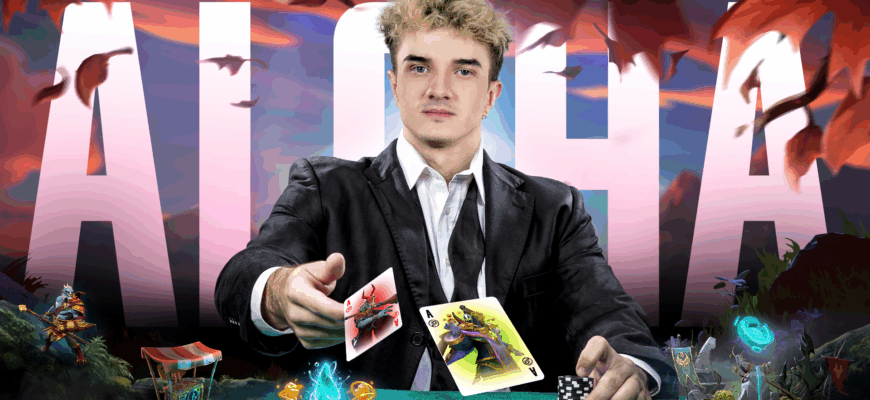The flashing lights, the roar of the crowd (virtual or otherwise), and the promise of digital glory often paint a picturesque, almost effortless, image of professional esports. Yet, behind the triumphant plays and highlight reels lies a reality far more demanding, a crucible where mental fortitude is tested as rigorously as mechanical skill. This rarely discussed toll on the human psyche has once again been brought into sharp focus by a candid admission from Ilya “ALOHADANCE” Korobkin, a prominent figure in the Dota 2 community.
The Unvarnished Truth from a Streamer`s Chair
In a recent broadcast on Twitch, ALOHADANCE, known for his formidable talent and analytical mind in the intricate world of Dota 2, laid bare the personal cost of his relentless pursuit of competitive form. After merely a month of consistent engagement in public matches – the battlegrounds where players hone their skills and climb the elusive MMR ladder – Korobkin confessed to experiencing significant mental strain. His words painted a stark picture:
“I can tell you that I`ve started having really serious problems with my head. I`ve started reacting very sharply to moments that I would have just smiled at before. It`s clear that my roof is going.”
This isn`t just a casual lament; it`s a profound statement highlighting the corrosive effect of prolonged, high-pressure engagement in a complex competitive game. The shift from lightheartedness to sharp reactivity suggests a diminished capacity for emotional regulation, a classic symptom of burnout and severe stress – a true testament to the psychological intensity inherent in mastering the game`s arcane complexities.
The Grind: A Double-Edged Sword
For many aspiring and established esports professionals, the “grind” is an almost sacred ritual. Hours upon hours are dedicated to refining mechanics, understanding meta-changes, and adapting strategies. While essential for skill development, this relentless pursuit often overlooks a crucial component: the human element. Dota 2, with its intricate layers of strategy, unpredictable teammates, and the constant threat of a game-losing mistake, is particularly adept at preying on mental vulnerabilities.
- Unpredictability of Public Matches: Unlike organized team play, public matches often throw together disparate individuals with varying skill levels, motivations, and communication styles. This chaotic environment can be incredibly frustrating, transforming a strategic challenge into an exercise in patience (or lack thereof). Navigating this randomness is a skill in itself, often more taxing than raw mechanical prowess.
- Performance Pressure: Every game carries weight, whether for MMR, stream viewership, or simply personal pride. The constant need to perform optimally, even when surrounded by less-than-optimal circumstances, is an immense psychological burden. Imagine having your job performance evaluated in real-time by thousands, often with little empathy.
- Toxicity and Criticism: The internet, particularly competitive gaming spaces, can be a breeding ground for harsh criticism and outright toxicity. Streamers like ALOHADANCE face this onslaught live, adding another layer of pressure to maintain composure and performance, all while being the target of anonymous vitriol.
The “Tier-1 or Nothing” Imperative
Adding another dimension to ALOHADANCE`s recent revelation is his previously stated ambition: a desire to play exclusively for top-tier teams. He expressed confidence in his ability to quickly regain the necessary form for such an endeavor, while explicitly rejecting opportunities in lower-tier organizations. This “Tier-1 or Nothing” mentality, while admirable in its ambition, encapsulates the cutthroat nature of professional esports. It suggests that anything less than the pinnacle is simply not worth the immense personal investment. This mindset, combined with the gruelling nature of the climb, can create an all-consuming focus that leaves little room for mental reprieve, elevating the stakes of every single match.
Beyond the Digital Arena: A Universal Challenge
ALOHADANCE`s experience is far from isolated. Across the esports landscape, stories of burnout, anxiety, and depression among professional players and streamers are becoming increasingly common. The industry, still relatively young, is grappling with how to effectively support the mental well-being of its stars, who often begin their careers at a tender age, ill-equipped to handle the immense pressures and public scrutiny that come with competitive digital glory.
Perhaps it’s time for a collective introspection. While the pursuit of excellence in competitive gaming is commendable, it should not come at the cost of an individual`s mental health. The digital battlefields of Dota 2, or any other esport, are ultimately playgrounds for human beings, not emotionless algorithms. And as ALOHADANCE`s poignant statement reminds us, even the most seasoned veterans can find their “roof going” under the relentless pressure to perform.
It serves as a sobering reminder: behind every player alias, every highlight reel, and every stream, there`s a person navigating a complex mental landscape. A landscape that, for some, is proving to be a much tougher opponent than any Roshan or Ancient.









